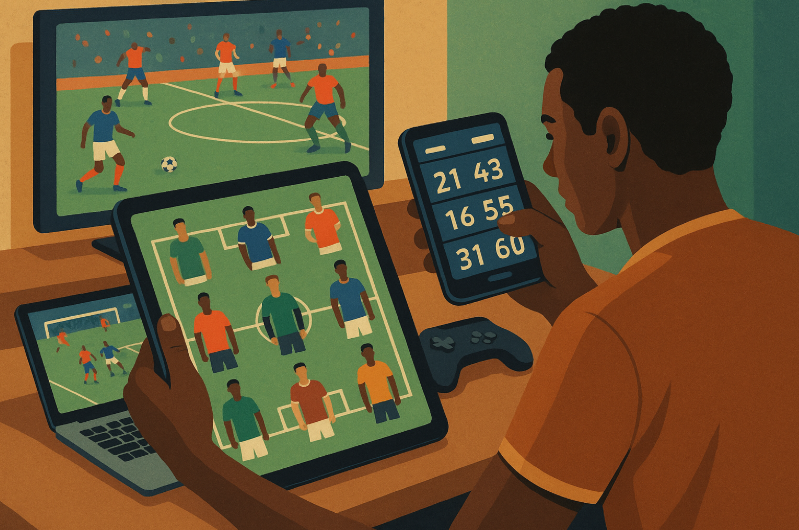How Fantasy Sports Platforms Are Blending With Betting
Fantasy sports have grown beyond simple hobby platforms. Across Africa, they now form part of broader betting ecosystems. These changes bring together digital innovation, user engagement, and new models of monetisation.
The shift began when platforms like the 1xbet site started offering fantasy games alongside their betting sections. These fantasy formats allow users to select virtual teams and earn points from real match outcomes. This gameplay has grown popular among football fans and users who follow local leagues.
What began as a skill-based contest now blends with betting incentives. Users can win prizes through predictions, while also accessing traditional odds-based wagering. This shift is changing how platforms design services and how fans interact with sports.
User engagement through hybrid design
Fantasy sports require users to follow matches closely. Points are calculated from real player performances. This keeps users involved throughout the season, unlike one-off bets. The introduction of prize pools, entry fees, and ranking boards links this format to traditional sports betting.
Modern platforms now merge account data across services. That means users switch between fantasy and betting without delays or extra logins. This design helps platforms increase time spent per session and encourages trial of multiple games.
- Player data updates in real time from league feeds
• Fantasy results affect betting suggestions
• Users move from free fantasy to paid contests easily
• Fantasy teams can be used in weekly or daily formats
• Leaderboards add social competition and prizes
Most apps now feature a central wallet. This allows quick transfers between fantasy games and betting slips. Users maintain control while enjoying both modes in one place.
App integration driving new habits
Fantasy play now appears in almost every mobile sports betting app. These games run on the same servers, using shared authentication and account settings. For many users, this reduces friction and creates seamless play.
In the middle of this ecosystem, the https://1xbet.com.lr/mobile supports fantasy football alongside classic match odds. The design allows for side-by-side views of fantasy results and active bets. This gives players more reason to stay logged in and adjust their plays as matches unfold.
Notifications and bonus systems also guide users between the two modes. For example, a strong fantasy result may unlock a free bet or cashback reward. These links are subtle but effective in keeping players engaged.
More fantasy users also means more data for platforms. It allows fine-tuning of odds, bonus timing, and player targeting. That gives betting operators a technical edge.
Fantasy play supports registration flows
Fantasy contests often attract new users who want to test their skills without risk. They usually begin with free contests before joining paid leagues. This journey also connects with traditional user onboarding.
In many cases, registration flows now include both betting and fantasy access. Platforms such as place your football bets on 1xbet include options to join fantasy leagues during signup. This dual access makes platforms more appealing and cuts user loss during setup.
Many operators found that players who engage first with fantasy stay active longer. These players learn rules, check stats, and get used to the platform. As a result, they are more likely to place future bets.
- Fantasy onboarding adds value to the registration process
• Player stats pages encourage informed bets
• Daily updates drive platform visits
• Bonus tokens reward early registration
• Paid contests follow free-entry play
This crossover flow supports brand loyalty and user trust. Fantasy play gives users more control, while betting completes the engagement loop.
Economic factors behind the trend
The spread of fantasy and betting hybrids is not just about user interest. Economic trends across Africa support it. Young mobile users dominate the market. They look for sports content that rewards attention, not just luck.
Fantasy contests reward research, timing, and team selection. They fit well with urban users who follow top leagues and use smartphones daily. Betting operators noticed this and adjusted their design plans.
The regional economic impact of sportsbooks in Africa also plays a role. Fantasy leagues increase user time-on-site, which supports ad placements and sponsor deals. At the same time, betting adds direct financial turnover. Together, they form a balanced model.
- Fantasy formats attract mobile-savvy sports fans
• Betting builds monetisation from informed users
• Sponsors benefit from more screen time per user
• Mobile access fuels growth in both play types
• Regulators track fantasy as a growing economic segment
This model also supports cross-border platform growth. Fantasy rules remain stable across regions, making them easy to adapt. Betting formats can be added based on local licensing.
Outlook for platform design
As fantasy sports and betting continue to merge, the next stage involves content layering. Players want in-depth match previews, stats, and team tips. Platforms now offer these inside both modes. This makes the transition between fantasy and betting even more fluid.
In the future, more games will use dual-entry systems. One contest can offer both a fantasy prize and a betting bonus. This ties engagement to both skill and chance. The trend works because it gives players more ways to interact.
The future of iGaming in Africa will likely centre on hybrid formats. Fantasy sports bring informed, regular users. Betting converts that traffic into revenue. The blend is logical and already reshaping user behaviour.
As platforms expand, those with clean design, fast mobile access, and cross-play features will lead. Fantasy games offer retention. Betting adds value. Their connection is now central to platform strategy.




